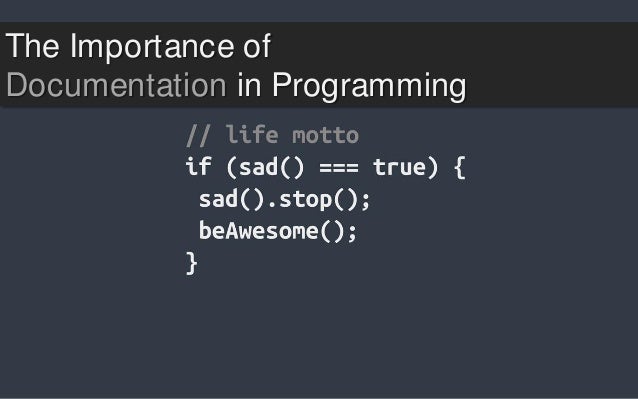The Importance of Documentation in Programming
Programming can be a complex and nuanced field. Even the simplest changes to code can have unintended consequences down the line if not properly documented. As programmers, we owe it to ourselves and our fellow colleagues to write clear and explanatory documentation so that others may understand our work, even months or years later when we may have long forgotten the specifics. This article will explore some common issues that arise without proper documentation, and stress the importance of taking the time to comment code.
Forgetting Your Own Work
It is only natural that over time, our memory of past work will fade. Yet as programmers, we are often asked to revisit and modify old code. One common joke in the field goes that “When a programmer first creates code, only they and God know how it works. A few months later, only God knows.” We see ourselves as masters of our domain when first writing, yet quickly lose recall of the nuances as more time passes. This phenomenon was eloquently demonstrated by one programmer who needed to make a change to older code. Upon examining it, their initial reaction was “This is crap! What sort of idiot would write it this way?” only to discover through version history it was their own work from months prior. It is humbling self-forgetfulness that affects us all, so documentation provides an invaluable reference even for our own past selves.

Enabling Collaboration
No programmer works in isolation forever. Projects expand, teams grow, and responsibilities shift over time. New colleagues will inherit and build upon code we wrote years ago. Without documentation, they are left to decipher through trial and error what was intended through even well-crafted code. This wastes valuable time that could be spent further improving or expanding functionality. Clear comments allow seamless handoffs between developers over the lifetime of the project. Future team members do not need to start from zero understanding when refactoring or adjusting code. Proper documentation future-proofs our work for effective collaboration long after we have moved on.
Coping with Syntax Evolution
All computer languages and frameworks are in a process of constant change and evolution. What was clear syntax yesterday may seem foreign concepts tomorrow. Programmers frequently shift between different languages and toolsets over the course of their careers. A Java developer moving to C++ will face a steep learning curve to re-familiarize with the latter’s nuanced syntax differences. Comments serve as reference material during these transitions, allowing us to more quickly ramp up on past skills. No one expects fluency after years away, but documentation expedites the re-learning process versus starting entirely from scratch.
Understanding Non-Obvious Logic
Not all aspects of code are immediately obvious just by examining the syntax tree. Complex algorithms, workaround for niche bugs, or optimizations may rely on non-trivial logic that is not self-evident to outside observers. Even years later when fully reacquainted with the syntax, the specific thought processes behind less than straightforward implementations may elude us. Comments provide the critical context to decode non-intuitive solutions. Simple notes on rationale can prevent wasted cycles reinventing solutions when a quick refresher is all that is needed.
Accommodating Varied Skill Levels
Within any team, programmers will have a diverse array of experiences, specializations, and current proficiency levels. Not all will be expert generalists capable of intuiting logic from abstract code. Junior developers and those from other specialties relying on our libraries may have more narrow understanding. By documenting edge cases, assumptions, and limitations, we ensure inclusion of all skill levels. No one need feel intimidated appending to or modifying well explanation code due to knowledge gaps. Proper commenting empowers even the least experienced to contribute in meaningful ways.
Future-Proofing for Unknown Unknowns
The only constant in technology is change. No matter how set a specific roadmap may appear today, unexpected pivots or new priorities regularly emerge. Our code may eventually serve wholly unanticipated use cases years down the line.
Without documentation as a Rosetta stone, its intent and context will be lost. But comments prevent brittle assumptions, allowing code to flexibly evolve while maintaining core functionality. They fortify our work against the unknown disruptions of an uncertain long-term future.
In summary, taking the small effort to write explanatory comments pays immense dividends. It future-proofs our work for collaboration, transfer of knowledge, adaptation to change, and unexpected challenges ahead. Documentation is the scaffolding that converts solid code into a robust, enduring asset for any organization or open-source community. The small investment fuels massive returns in flexibility and resilience over products’ lifespan.
